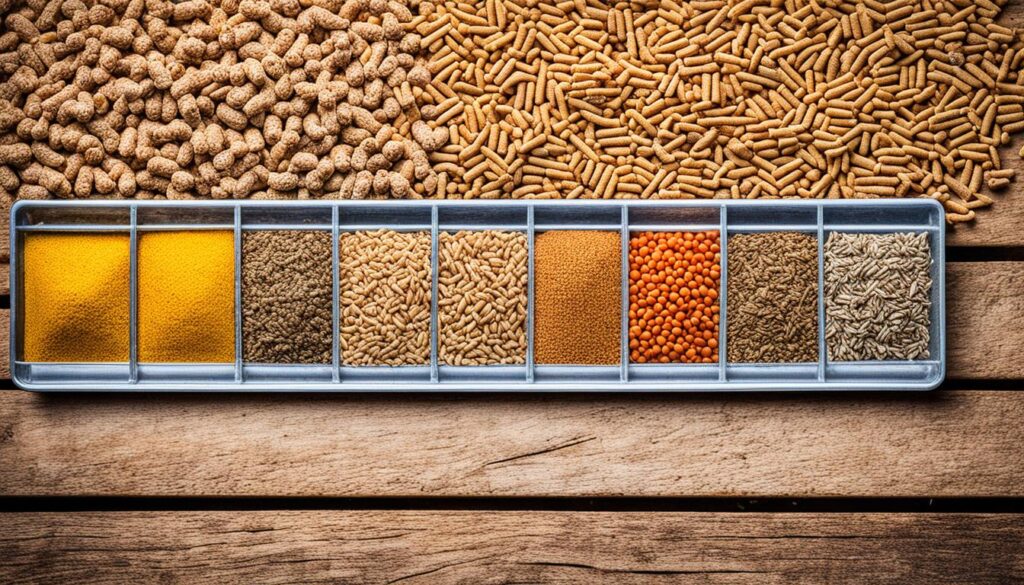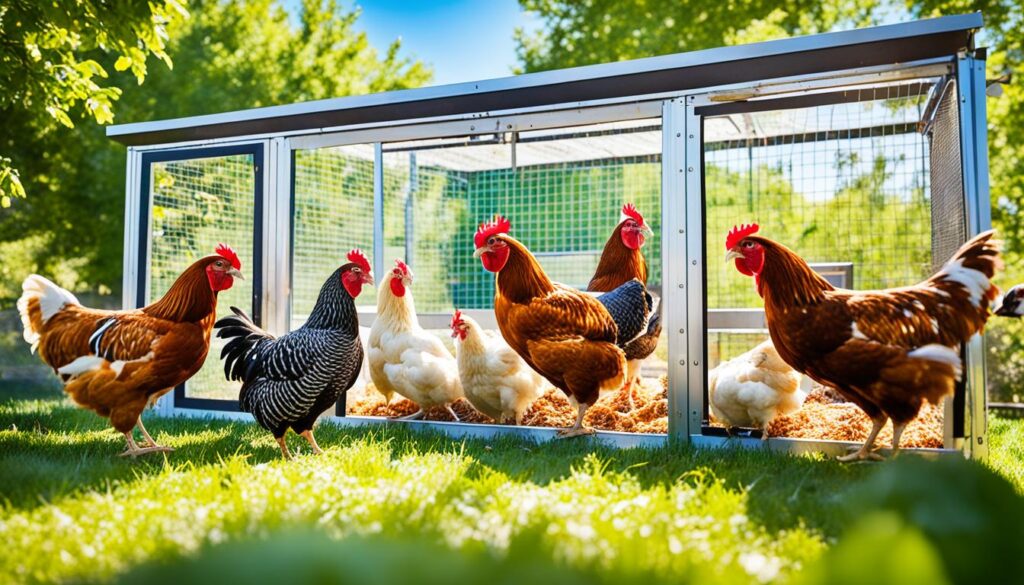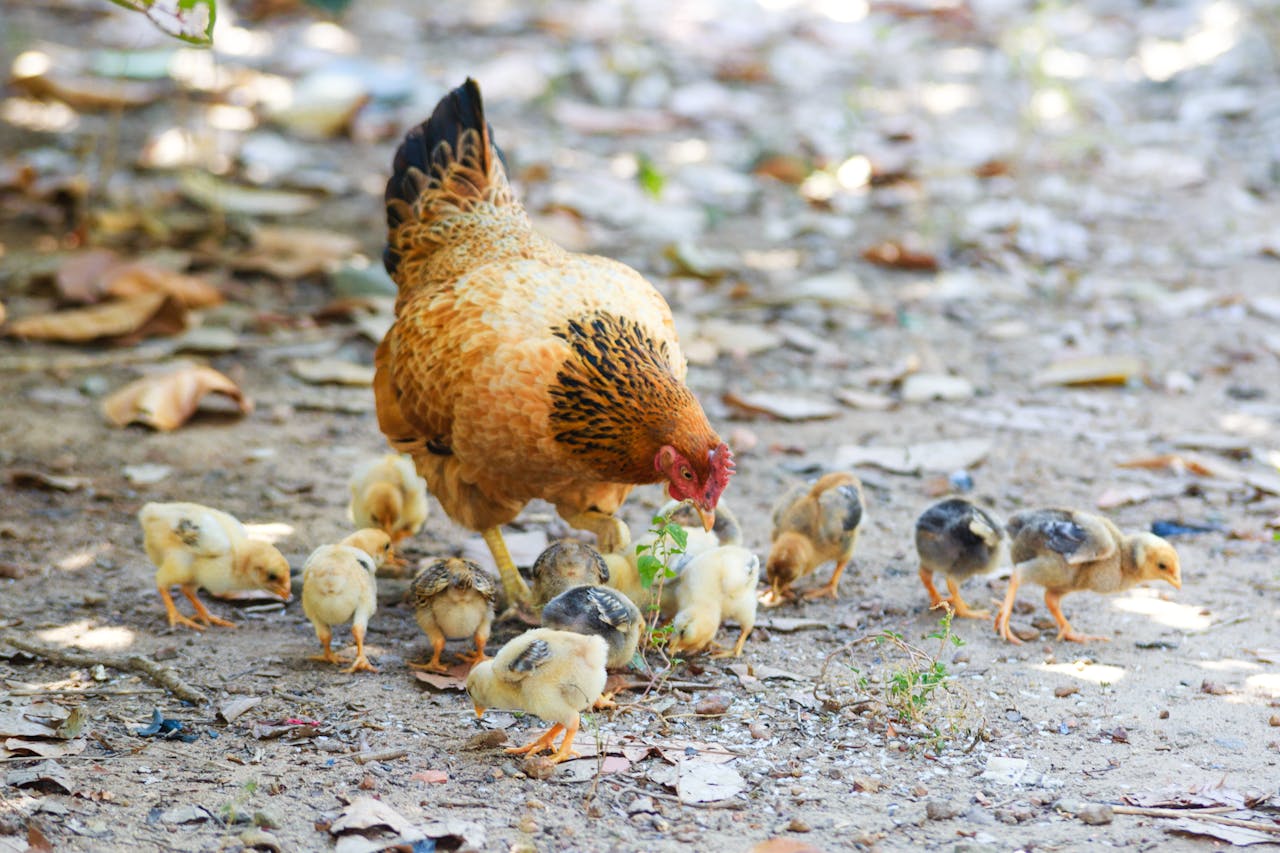As a poultry owner, I know how crucial a nutritious diet is for chickens. This diet keeps them healthy and boosts their ability to produce. Whether you’re raising chickens in your backyard or for production, you must meet their nutritional needs.
Choosing the right chicken feed involves several factors. These include the feed type, supplements, and when to feed them. A balanced diet is key for your hens’ health. It ensures they get the nutrients needed during their life stages. Let’s dive into some tips to keep your chickens well-fed and happy.
Key Takeaways:
- Nutritious chicken feed is vital for the health and productivity of your flock.
- A balanced diet provides essential nutrients at different life stages.
- Consider factors like species, age, and health status when determining nutritional requirements.
- Additives in chicken feed improve growth, laying capacity, and disease prevention.
- Provide clean water and adequate space for all chickens to eat and drink.
Understanding the Nutritional Needs of Chickens
Chickens need specific nutrients to be happy and healthy. Giving them a balanced diet with all necessary nutrients is important. This supports their growth and good health.
Protein for Chickens
Protein is vital for chicken muscle growth and health. It helps them stay healthy and function well. Egg-laying hens need more protein for their egg production.
Grains for Chickens
Oats, corn, and wheat give chickens key vitamins, minerals, and protein. Adding these grains to their diet meets their needs. Whole grains are best because they have more nutrients.
Greens for Chickens
Chickens get essential vitamins and minerals from fresh greens. These include Vitamins E and A, Riboflavin, and Calcium. Letting them forage gives them these important nutrients naturally.
Grit for Chickens
Chickens need insoluble grit, like small rocks or sand, for digestion. It helps them digest food and absorb nutrients better. Grit also gives them calcium for strong eggshells.
Vitamins for Chickens
Vitamins are key for chicken health. Vitamin A boosts egg production, and Vitamin D strengthens bones. Chickens usually get Vitamin D from sunlight. In low-light areas, they may need Vitamin D added to their diet.
Water Intake for Chickens
Chickens must have fresh water every day. An adult chicken drinks about 400ml daily. Make sure they have plenty of clean water, especially when it’s hot. Without enough water, they might eat less, which can harm their health.
Understanding what chickens need for nutrition helps you give them a good diet. This diet supports their growth, health, and happiness.
| Nutrient | Function | Sources |
|---|---|---|
| Protein | Essential for muscle growth and development | Meat, legumes, soybean meal |
| Grains | Provide vitamins, minerals, and protein | Oats, corn, wheat |
| Greens | Supply important vitamins and minerals | Leafy greens, herbs, vegetables |
| Grit | Aids in digestion and provides calcium | Small rocks, sand |
| Vitamin A | Important for egg production | Carrots, sweet potatoes, liver |
| Vitamin D | Crucial for bone health | Sunlight, Vitamin D supplements |
| Water | Essential for hydration and overall health | Fresh clean water |
Providing for the nutritional needs of chickens helps them stay healthy and productive. Ensure their diet includes protein, grains, greens, grit, and vitamins. Always offer them fresh water to drink.
Choosing the Right Feed for Your Chickens
Choosing the right feed for your chickens is key. You need to match their feed to their life stage. Let’s look at the different feeds and how to pick the best ones for your flock.
Types of Chicken Feed
Chicken feed comes in several types, each with unique benefits:
- Mash: This is finely ground feed for chicks. It’s a complete nutrition start.
- Pellets: These are mash pressed into pellets. They reduce waste and are good for older chickens.
- Crumble: This is pellet feed broken into smaller pieces, perfect for chicks to eat.
- Scratch Grains: These grains are treated to be a treat. You can scatter them for your chickens to peck at.
Remember, commercial feeds are designed for specific stages of chicken life. For chicks, there’s starter-grower feed. Laying hens need layer feed. And there are special feeds for broilers and large breeds.
Treats and Supplements
While treats can be fun, they shouldn’t be more than 10% of the diet. Too many treats can mess up their nutrition.
For treats, go for healthy ones. A good pick is Purina Farm to Flock Treats. They’re nutritious without upsetting the diet balance.
Feeding Non-Laying Chickens
Non-laying chickens, like roosters or older hens, need different feed. A maintenance feed works well for them.
If you’ve got large breed chickens, watch their feed amount. Large breed feed has the nutrients they specifically need.
| Feed Type | Recommended for |
|---|---|
| Starter-Grower Feed | Chicks |
| Layer Feed | Laying Hens |
| Maintenance Feed | Non-Laying Chickens |
| Broiler Feed | Meatbirds |
| Large Breed Chicken Feed | Large Breeds |

Choosing the correct feed is crucial for your chickens’ health. Balancing their diet with carefully picked treats and supplements will keep your flock healthy. This will help them lay tasty eggs.
Best Practices for Feeding Your Chickens
To keep your chickens healthy, it’s key to feed them right. Here are some top tips:
- Follow a feeding schedule:
- Offer water and feed in clean containers:
- Ensure an ample supply of fresh water:
- Prevent nutrient dilution:
- Monitor body condition:
- Store feeders away at night:
- Avoid feeding harmful foods:
Have a regular feeding time each morning. Give your chickens complete feed before they find food outside. Don’t mix in scratch grains with their feed. This mix lowers the food’s nutritional worth.
Use clean containers for water and feed that are easy to wash. Make sure there’s enough room for all chickens to eat and drink together. To prevent fighting, have multiple containers.
Chickens need lots of clean water daily. An adult chicken drinks about 400ml each day. When it’s hot, they need even more water to stay hydrated.
Stick to the 90/10 rule: 90% complete feed and only 10% treats. This keeps their diet full of essential vitamins and minerals.
Check how your chickens are doing, especially the big ones, to keep them at a healthy weight. Weighing them once a month is good. Avoid letting them get too skinny or fat, as it can cause health issues.
Put away the feeders at night. This prevents rodents and bugs from getting into the feed and water and making your chickens sick.
Don’t give your chickens food that ruins the taste of their eggs. Foods like garlic and onions can do that. Avocado pits and skins, undercooked beans, dried beans, and rhubarb are harmful to them.
Feeding your chickens correctly is vital for their health and happiness. Following these best practices will help them get the nutrients they need to flourish.
Tips for Chicken Feeding:
- Always keep chicken feeders and waterers clean to avoid contamination.
- Watch how much your chickens eat and adjust the amount so they don’t eat too little or too much.
- Offer a peaceful place for your chickens to eat. This lowers stress and helps them eat better.
- Try using different feeder types to suit different chicken preferences and reduce conflict.
- If you’re unsure, talk to a chicken nutrition expert or vet for advice tailored to your flock’s needs.
| Feeding Practice | Benefits |
|---|---|
| Following a feeding schedule | Ensures consistent nutrition and prevents overfeeding |
| Offering clean water and feed | Helps maintain hydration and prevents the spread of diseases |
| Preventing nutrient dilution | Ensures a balanced diet and prevents deficiencies |
| Monitoring body condition | Helps manage weight and prevent health issues |
| Storing feeders away at night | Reduces the risk of attracting pests and vermin |
| Avoiding harmful foods | Prevents toxic reactions and maintains egg flavor |
Conclusion
It’s vital to feed your chickens right to keep them healthy. Their diet should include protein, grains, greens, and more. These nutrients make sure they live well. A good diet boosts health and care in backyard chickens.
It’s key to pick the best feed for your chickens. Feeds like those from Stockfeed cover their needs for each stage of life. Treats are okay sometimes, but they should not replace regular food. This balance is crucial for their energy and health.
How you feed your chickens matters too. Start with complete feed in the morning, then let them forage. Always fresh, clean water is a must for them. This way, you avoid overfeeding with treats and keep them in good shape.
Caring for your chickens’ nutrition leads to happy, healthy hens. A balanced diet is necessary for your birds’ happiness. With careful feeding, your chickens will flourish, making your backyard or farm lively.




